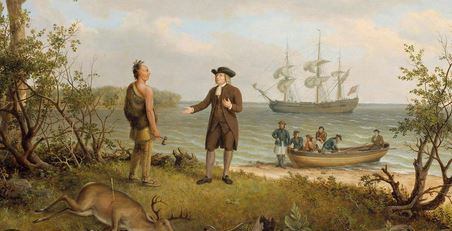NEW JERSEY - A state known for its diverse landscapes, bustling cities, and proximity to major metropolitan centers, boasts a rich and complex history that predates the United States itself. From the long presence of the Delaware Indians to the successive waves of Dutch, Swedish, Finnish, and English settlers, New Jersey's early history is a story of cultural exchange, shifting power dynamics, and the gradual formation of a unique colonial identity.
New Jersey's Diverse Roots: Tracing the History of Early Settlement and Colonial Transitions
This article explores the key events and groups that shaped the early settlement and development of New Jersey.
The First Inhabitants: The Delaware Indians (Lenape)

European Colonization: A Tapestry of Influences
New Jersey's colonial history is marked by a diverse array of European influences:
- Dutch: The Dutch were the first Europeans to establish a permanent settlement in New Jersey. In 1660, they founded Bergen (present-day Jersey City) as part of the New Netherland colony, centered on New Amsterdam (New York City) (Source: Historical accounts of New Netherland, New Jersey State Archives).
- Swedes and Finns: Swedes and Finns also established a presence in the region, contributing to the early European settlement of Bergen and other areas along the Delaware River, forming part of the New Sweden colony (Source: Swedish Colonial Society, historical records of New Sweden).
- English: In 1664, the English seized control of New Netherland from the Dutch, renaming the colony New Jersey, after the Isle of Jersey in the English Channel. This marked a major shift in power and ushered in a new era of English colonization (Source: Colonial records of New Jersey, British historical archives).
- New England Puritans: Following the English takeover, New England Puritans migrated into the area, seeking new opportunities and, in some cases, greater religious freedom.
- Scottish Quakers: Inspired by the promise of religious toleration, Scottish Quakers also settled in New Jersey, contributing to the colony's growing religious diversity.
Division and Reunification: East and West Jersey
New Jersey's early colonial history was marked by a period of division. In 1676, the colony was split into East Jersey and West Jersey, with distinct proprietors and governance structures. This division reflected competing claims and different approaches to land ownership and settlement (Source: Historical accounts of East and West Jersey).
A Royal Colony: Under Crown Control
In 1702, the proprietors of both East and West Jersey surrendered their governing power to the English Crown, and New Jersey became a unified royal colony. This marked a significant shift towards greater centralized control under British authority (Source: Colonial records of New Jersey).
A Royal Governor: Consolidating Authority
In 1738, New Jersey received its own royal governor, Lewis Morris, separating it from the shared governorship with New York. This appointment further solidified New Jersey's identity as a distinct colony with its own administration (Source: Biographies of Lewis Morris, New Jersey colonial records).

Sources:
- New Jersey Historical Society
- Lenape Nation of Pennsylvania
- Historical accounts of New Netherland
- New Jersey State Archives
- Swedish Colonial Society
- Colonial records of New Jersey
- British historical archives
- Historical accounts of East and West Jersey
- Biographies of Lewis Morris


